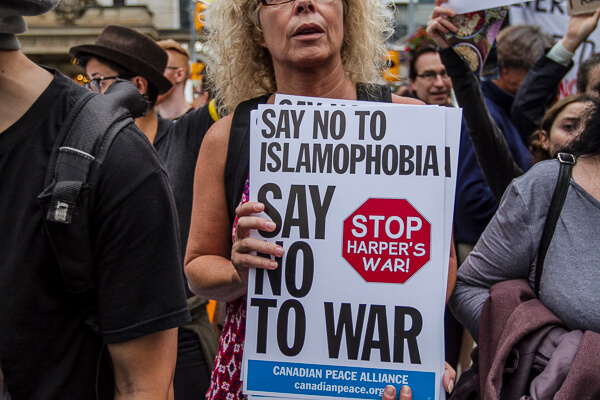
Unlike the pictured protester, many Canadians have been muted when it comes to speaking up for Muslims who have been attacked throughout this election campaign.
Photo Credit: NCM Stock Image by Nariman Ansari
This is our final Election Watch column before votes are cast on Oct. 19. After a campaign that has been marked by the unexpected, where do matters stand less than a week before Election Day?
The heart-wrenching photograph of three-year-old Alan Kurdi’s body on a Turkish beach made the years-long Syrian refugee crisis a reality for millions of Canadians, prompting demands to do more to assist the persecuted.
Minister of Citizenship and Immigration Chris Alexander’s initial efforts to stick with his party’s talking points on the refugee crisis were met with incredulity, forcing the Conservative party to fall in line with the Liberals and New Democrats in promising to act with greater resolve.
Yet, the Conservatives have since resumed stressing that they will place the ‘safety of Canadians’ ahead of humanitarian obligations to refugees – even those whose vulnerability has been confirmed by the United Nations High Commissioner for Refugees.
[A]s memories of the photograph of [Alan] Kurdi’s body fade, so too has criticism of the Conservatives’ idiosyncratic response to the refugee crisis.
Under a Conservative government, Canada will continue to select refugees according to its own “areas of focus” which grant preference to members of persecuted religious minorities whose age, skills and training enhances their employability and propensity to integrate successfully into Canadian society.
But, as memories of the photograph of Kurdi’s body fade, so too has criticism of the Conservatives’ idiosyncratic response to the refugee crisis.
Calculated niqab debate
The Conservatives’ position on the niqab has generated a potentially more consequential public reaction.
The strategic calculations behind the Conservatives’ decision to politicize the issue are clear.
Widespread opposition to the niqab in Quebec, along with the New Democratic Party’s (NDP) support of the courts’ decision to allow the niqab-wearing women to take the oath of citizenship, provided the Harper government with a welcome opportunity to exploit the issue and cut into the NDP’s lead in the province.
[T]he Conservatives have expanded their culture war.
The Conservatives have since doubled down on their position, promising to amend the Citizenship Act if re-elected.
The strategy has worked remarkably well, spurring a jump in popularity for the Conservatives in the Quebec City area, the region of the province where they have the best chances of capturing seats. More importantly, the niqab debate has also coincided with a sharp decline in support for the NDP in Quebec.
Buoyed by these results, the Conservatives have expanded their culture war, promising to introduce a hotline for reporting “barbaric cultural practices” and, most recently, pledging to consider a ban on niqab-wearing women in public service.
They also revoked the citizenship of convicted terrorists and publically mused about the merits of stripping citizenship from other classes of criminals.
Limited support for multiculturalism
Verbal and physical attacks on Muslim women, graffiti on Muslim candidates’ lawn signs and the growing sense of unease among Canadian Muslims speak to the costs of the Conservatives’ strategy.
And yet, the response of Canadians to these assaults on fellow citizens has been muted.
Polls suggest that Canadians across the country are, in fact, supportive of the Conservatives’ positions. What does this tell us about the state of Canadian democracy?
Canadians’ support for multiculturalism is limited.
First, it suggests that Canadians’ support for multiculturalism is limited. Intolerant or merely opportunistic politicians can count on a reservoir of such support in advancing their agendas if they play their cards right.
The Conservatives have done exactly this: the relatively diffuse spread of Muslim voters, along with a broad-ranging antipathy toward the niqab, made this a worthwhile gamble.
By making the niqab an issue the Conservatives have harmed the NDP’s chances in the province Quebec, making it much less likely that the New Democrats – the frontrunner at the start of this campaign – will emerge with the most seats on Oct. 19.
The Conservatives’ ability to hold onto ridings in both the Greater Toronto Area and Greater Vancouver Area will provide the ultimate test of its strategy.
Second, if such bans become legislated, the ongoing battle between elected governments and the courts will continue.
While Stephen Harper has framed the NDP and Liberal parties’ resistance to niqab bans as being “on the wrong side of the electorate”, they’re on the right side of constitutional laws intended to shield minorities from the potentially unconstitutional preferences of democratic majorities.
We need only recall the overwhelming public opposition to Sikh turbans in the Royal Canadian Mounted Police (RCMP) 25 years ago to see how important the courts can be in preserving minority rights in the face of public pressure.
The coveted new Canadian vote
Finally, the election raises questions about the Conservative party’s longstanding efforts to replace the Liberal party as the “natural home” of new Canadian voters.
The Conservative’s positions on the niqab currently enjoy support from a majority of Canadians, including new Canadian voters. But the extension of the culture wars into the final days of the campaign may be risky.
If the Conservatives’ strategy is successfully framed as an attack on Canadian multiculturalism and the Charter of Rights and Freedoms, it may come back to haunt the party.
The Conservatives’ ability to hold onto ridings in both the Greater Toronto Area and Greater Vancouver Area will provide the ultimate test of its strategy.
Phil Triadafilopoulos is Associate Professor of Political Science at the University of Toronto Scarborough and the School of Public Policy and Governance.
Inder Marwah is Assistant Professor of Political Science at McMaster University.
Steve White is Assistant Professor of Political Science at Carleton University.




